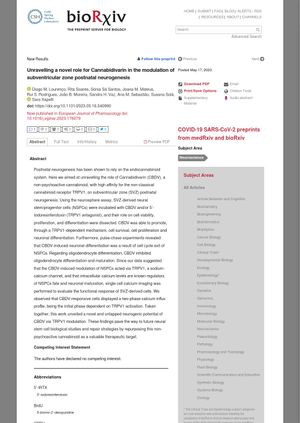Unravelling a Novel Role for Cannabidivarin in the Modulation of Subventricular Zone Postnatal Neurogenesis
May 2023
in “
bioRxiv (Cold Spring Harbor Laboratory)
”

TLDR Cannabidivarin (CBDV) helps new brain cells grow and develop in a specific brain area through a certain receptor.
The study investigates the role of Cannabidivarin (CBDV), a non-psychoactive cannabinoid, in postnatal neurogenesis in the subventricular zone (SVZ). Using a neurosphere assay, neural stem/progenitor cells (NSPCs) from the SVZ were treated with CBDV and/or 5’-Iodoresinferotoxin (a TRPV1 antagonist). The results showed that CBDV promotes cell survival, proliferation, and neuronal differentiation through a TRPV1-dependent mechanism. Additionally, CBDV was found to inhibit oligodendrocyte differentiation and maturation. The study also found that CBDV-responsive cells displayed a two-phase calcium influx profile, with the initial phase dependent on TRPV1 activation. These findings suggest that CBDV has a novel neurogenic potential via TRPV1 modulation, which could be valuable for future neural stem cell studies and repair strategies.



